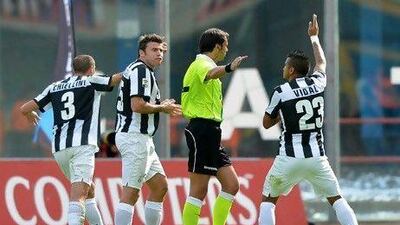Antonino Pulvirenti felt incensed. The Catania president had seen his side lose 1-0 to Juventus and thought the officiating had deprived his team of a 1-0 win.
"There are seven referees out there," he wailed, counting up the main referee, the two linesmen, the pair of goal-line officials now employed in Serie A, plus the official in between the technical areas and the observer referee in the stands.
Seven referees for 22 players sounds a lot when you put it as Pulvirenti did. Alas, weekends like the last do nothing to help the argument that increased quantity means higher quality.
Television replays highlighted errors affecting the outcomes of half the fixtures. Juve's goal followed a shot from an offside Nicklas Bendtner, while Catania's Gonzalo Bergessio had seen a strike ruled out, wrongly, for offside.
Part of Pulvirenti's anger was directed at the process that, he believed, led to that decision.
Initially the referee Andrea Gervasoni signalled a goal and the linesman Luca Maggiani kept his flag unraised. A consultation between the two then disallowed the "goal".
By which time Maggiani had been mobbed by the Juventus substitutes, leading Pulvirenti to believe pressure had changed Maggiani's mind.
Which means one of the seven officials was not doing their job: the sixth official, who patrols the area of the dugouts, and is empowered to ensure coaches and substitutes obey the rules. It is not their right to hector linesmen. A few red cards for doing so would remind the bullies in warm-up bibs of that fact.
Follow us


